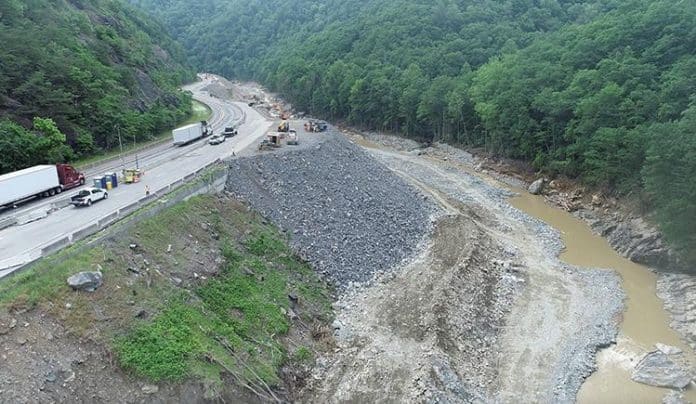North Carolina Construction News staff writer
The North Carolina Department of Transportation has selected two sites in the Pigeon River Gorge to extract and store materials for rebuilding a heavily damaged section of Interstate 40, officials announced Tuesday.
The sites, located in the Pisgah National Forest near the eastern end of the storm-damaged corridor, will be critical in accelerating repairs caused by Hurricane Helene. A nearly 33-acre site will be used to extract stone, while an adjacent 11.5-acre site will temporarily store overburden material. Once construction concludes, the stored material will be used to restore the extraction site.
Officials say the local sourcing of materials will reduce project costs and timelines, as well as improve safety and travel times for drivers. Avoiding long-distance hauling of rock will also reduce the number of heavy trucks in the current two-lane traffic pattern through the gorge.
“This decision will have the lowest impact on the long-term health of the forest out of all the possible sites,” said Wesley Grindstaff, Division 14 engineer for NCDOT. “The coordination between all agencies and stakeholders in the area has been tremendous and provides a great start to reconstruction of this critical corridor.”
The U.S. Department of Transportation’s Federal Highway Administration (FHWA) received a temporary land transfer from the U.S. Forest Service to allow NCDOT to test and evaluate up to seven potential locations. After extensive surveys and resource analysis, FHWA issued a temporary easement for the two selected sites.
“The U.S. Department of Transportation is committed to helping North Carolina rebuild, and with this site selection we are one step closer to rebuilding I-40 at lightning speed,” U.S. Transportation Secretary Sean P. Duffy said in a statement.
The site selection process included environmental and cultural resource surveys, access road design refinements, and input from agencies including the U.S. Army Corps of Engineers, U.S. Fish and Wildlife Service, and several North Carolina state agencies.
As mineral extraction preparations begin, federal and state agencies are collaborating on a long-term restoration plan to return the forest to its natural state and improve wildlife habitats after construction.
“Once this critical work is complete, we will have the opportunity to improve ecological resiliency through forest restoration, as well as improve game and aquatic habitats,” said James Melonas, Forest Supervisor for the National Forests in North Carolina.
NCDOT has already stabilized 10 locations along the 4-mile stretch of I-40 and reopened two westbound lanes to carry traffic in both directions. Those lanes opened on March 1, reconnecting communities and freight corridors between North Carolina and Tennessee.
Construction crews are currently building a causeway along the river, providing access for geotechnical analysis and future retaining wall construction. Later this summer, once permitting is complete, crews plan to install a temporary bridge, improve the haul road, and begin extracting stone.
The reconstruction will incorporate roller-compacted concrete walls and interlocking O-pile walls to stabilize the corridor permanently.
“We are pleased that we have reached another milestone on this long path to reconstruction,” Grindstaff said. “NCDOT and our partners will continue working in the Gorge and on designs to build the best facility possible.”

